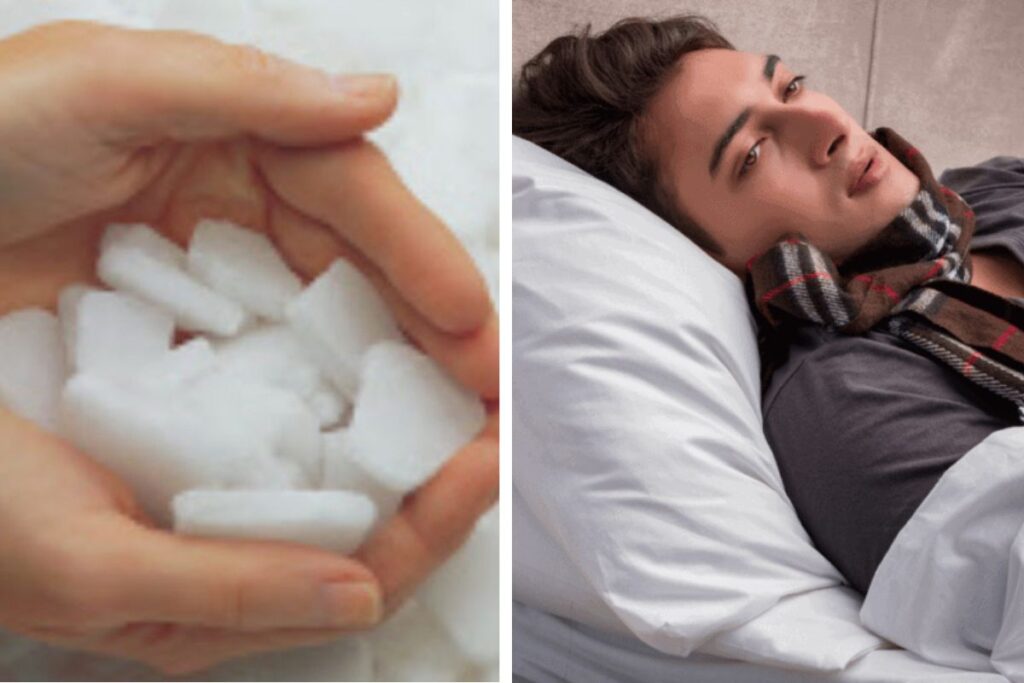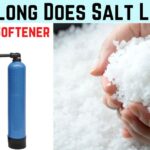Whether you have a water softener or not, it’s essential to be aware of salt’s effects on your body and your plumbing.
While is water softener salt safe to eat generally in small quantities, it’s still best to avoid consuming it whenever possible.
This post examines salt and what you need to know about it. We’ll also discuss some health risks associated with overeating salt pellets.
So, if you’re curious whether salt is safe to eat, keep reading.
Is Water Softener Salt Poisonous?
Salt is an essential ingredient in softeners. It works by exchanging ions with hard water minerals to softened water.
However, some people are concerned that the sidewalk salt used in softeners may be poisonous.
There is no evidence that salt is poisonous. In fact, salt is an essential nutrient for our bodies, and we consume it daily in our food.
The amount of salt used in drinking water softeners is minimal and poses no health risk.
If you have any concerns about the safety of water-softening salt, please consult your doctor or healthcare provider.
Can You Use Softener Salt With Food, Such As Canning or Meat Packing?
Salt is an essential ingredient in many types of food preservation, including canning and meat packing. However, the kind of salt you use is critical.
Salt, also known as solar salt or evaporated salt, is not recommended for use with food.
Salt is made from evaporated seawater or brine blocks.
It contains high levels of minerals, including magnesium ion and calcium chloride, which can give food an off-flavor.
In addition, softener salt edible can leave a residue on dishes and cooking utensils. For these reasons, it is best to use regular table salt or kosher salt for preserving foods.
If you use salt, rinse it off any food that will come into contact with it. This will help remove residual salt and prevent the food from becoming overly salty.
It is also important to note that salt should not be used in softened water. The water softening process requires a different type of salt, such as sodium chloride, to function correctly.
Where Does Food Grade Salt Come From?
Salt is essential in many recipes, but not all are created equal. To be classified as food grade, salt must meet specific purity standards.
Salt is typically mined from underground deposits but can also be harvested from evaporated seawater.
In either case, the salt must be purified to remove any impurities before it can be considered food-grade.
Salt impurities can come from various sources, including dirt, rocks, and other minerals from water that may be present in the salt deposit.
The purification process usually involves washing the salt with a water supply and filtering it to remove unwanted particles.
Once the salt (sodium ion) has been purified, it can be used in various culinary, food preservation, and manufacturing applications.
Food-grade salt is also sometimes used in cosmetics and personal care products.
If you’re looking for salt to use in your cooking, choose a product labeled as food grade.
This will ensure you get a pure, high-quality product that will give your dishes the perfect flavor.
Does Your Salt Contain Iodine?
Iodized salt is a dietary supplement containing iodine. It prevents and treats iodine deficiency and its consequences, including goiter.
Iodine is an essential trace element needed for the proper development and function of the thyroid gland.
The body does not make iodine, so it must be obtained from food or supplements.
Iodized salt is widely available in grocery stores and supermarkets. Most table salt sold in the United States is iodized. Check the label to see if a product is iodized.
Iodine deficiency can cause goiter, an enlargement of the thyroid gland. Iodine deficiency can also lead to other problems, such as mental retardation and congenital disabilities.
Iodine deficiency is the most common cause of preventable mental retardation worldwide.
Iodine deficiency is a problem in many parts of the world, including some areas of the United States.
The best way to prevent iodine deficiency is to eat foods containing iodine or take a supplement.
If you are pregnant, it is essential to get enough iodine. Iodine is needed to properly develop the baby’s brain and nervous system.
A pregnant woman who does not get enough iodine can have a baby with mental retardation or other congenital disabilities.
Iodized salt is safe for most people. If you have a condition that causes you to retain sodium, such as heart failure or kidney disease, talk to your doctor before using iodized salt.
This article is for information only. After consulting a qualified healthcare provider, only use this information to diagnose or treat a health problem or disease.
Can Water Softener Salts Make You Sick?

You might be surprised to learn that the answer is yes – salt can make you sick if it’s not used correctly.
Salt is made up of sodium chloride, a chemical compound that can be harmful if ingested in large quantities.
If you have ever had too much rock salt, it can make you feel bloated and uncomfortable.
The same thing can happen if you use softener salt that contains iodine. Iodine is a trace element essential for human health, but too much of it can be dangerous.
If you use softener salt that contains iodine, be sure to follow the manufacturer’s instructions carefully.
Don’t use more rock salt than recommended, and don’t let the rock salt come into contact with food or drinks.
If you have ingested too much iodine, seek medical attention immediately.
Symptoms of iodine poisoning include nausea, vomiting, diarrhea, and abdominal pain. In severe cases, it can lead to coma and death.
So, while softener salt can be a great way to keep your soft water clean and free of hard sodium chloride minerals, it’s essential to use it safely.
Be sure to follow the manufacturer’s instructions. If you have concerns, speak to your doctor or a qualified medical professional.
Does Food Preservation, Such As Canning Or Meat Packing, Allow Softener Salt?
Yes, food preservation methods such as canning and meat packing allow the use of softener salt. Softener salt helps to keep food fresh and prevents spoilage. It is also effective in killing bacteria.
Are There Different Types Of Water Softener Salt?
Of course, there are different types of water softener salt. The most common type is sodium chloride, also known as table salt.
This type of salt is the most affordable, and it is also the most effective at removing hard water minerals.
Another type of salt is potassium chloride. This type of salt is more expensive than sodium chloride. Still, it is less effective at removing hard water minerals.
Potassium chloride is also known to cause skin irritation in some people, so it is not the best choice for everyone.
Finally, there is solar salt. Solar salt is made from evaporated seawater, the most expensive softener salt.
Solar salt is also the least effective at removing hard water minerals, but it does have some benefits.
Solar salt is less likely to cause skin irritation and is more environmentally friendly than other types of salt.
How Much Water Softener Salt Do I Need To Use?
The amount of water softener salt you need will depend on your water’s hardness.
If you have very hard water, you may need more salt than with only slightly hard water.
You can test the hardness of your drinking water taps at home with a simple unsoftened water hardness test kit.
Most softeners come with a salt-setting knob that you can use to adjust the amount of salt used.
As a general rule of thumb, you should start by setting the knob to the middle setting and then adjust as needed based on your tap water hardness test results.
If you find that you are using too much salt, you can try one of the following tips to reduce the amount of salt you are using:
– Rinse the softener unit more frequently. This will help remove any salt build-up that may be causing the unit to use more salt than necessary.
– Adjust the water softener setting knob to a lower setting. This will decrease the amount of salt being used.
– Use a salt that is designed to dissolve more slowly. This type of salt can help reduce the amount of salt being used.
If you find that you are not using enough salt, you can try one of the following tips to increase the amount of salt you are using:
– Rinse the softener unit less frequently. This will allow any build-up of hardness minerals to remain in the unit, which will require more salt to remove.
– Adjust the softener setting knob to a higher setting. This will increase the amount of salt being used.
– Use a salt that dissolves more quickly. This type of salt can help increase the amount of salt being used.
Consider using a softener with an automatic regeneration feature. This type of softener will regenerate itself based on the amount of water that has been used.
This can help reduce the salt you need because the unit will not need to be manually regenerated as often.
Suppose you have questions about how much softener or additional sodium you should use.
In that case, you should consult your owner’s manual or contact the manufacturer of your unit.
Advantages and Disadvantages of Using Water Softener Salt Safe to Eat?
Salt is often lauded for its ability to remove hard water minerals from household plumbing and appliances.
However, some may wonder if the sodium level is safe for human consumption.
The short answer is that salt is not poisonous and will not harm you if ingested in small amounts.
However, eating large quantities of salt is not recommended as it can cause adverse health effects.
The water softener system comprises sodium chloride, the same type of salt used in cooking and baking.
The difference is that water softener pellets have been purified and do not contain any additives or impurities.
While sodium chloride is not poisonous, it is essential to remember that it is a salt and should be consumed in moderation.
Too much salt can lead to high blood pressure, dehydration, and other health problems.
If you have young children in your home, it is essential to keep salt out of their reach as they may be tempted to eat it.
Generally, it is best to keep all salt products out of reach of children and pets.
Overall, salt is safe to eat in small quantities. However, it is essential to use it sparingly and to avoid eating large amounts of salt to reduce the risk of adverse health effects.
Conclusion
In conclusion, while salt is not meant to be eaten, it is not harmful if consumed in small amounts.
The amount of sodium in water softener salt is low and will not pose a health risk to most people.
However, if you are on a sodium-restricted diet, you should avoid salt.
If you accidentally consume salt, drink plenty of fluids and contact your doctor if you experience any adverse effects. This article is helpful to you. Thank you for reading!






